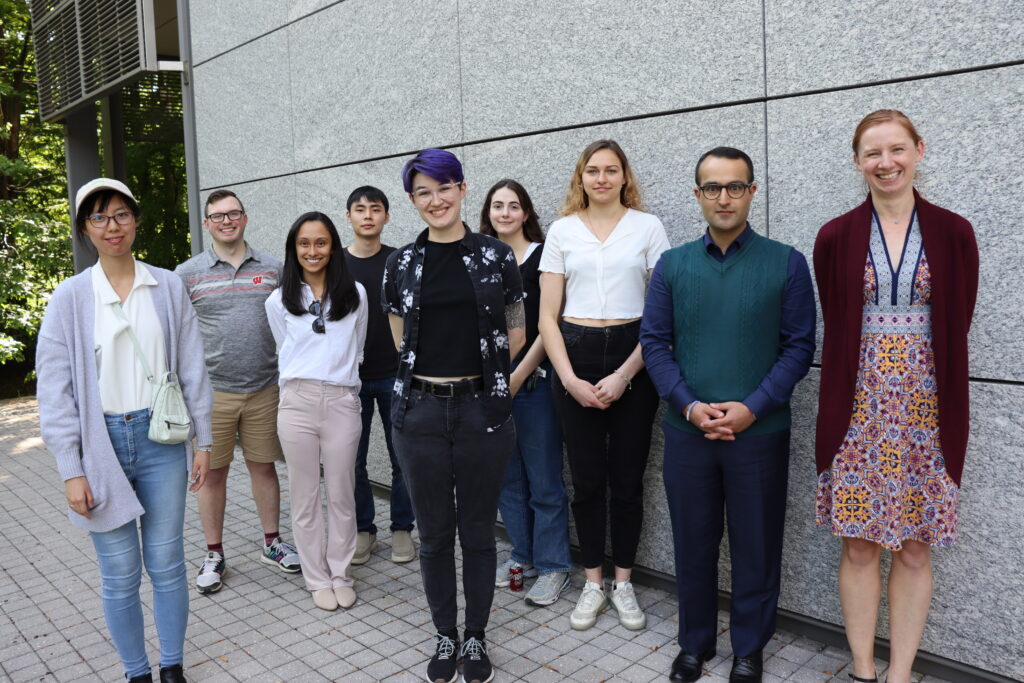Erin Stache Joins Princeton Chemistry Faculty
The Department of Chemistry is pleased to welcome Erin Stache as assistant professor.
Stache joins Princeton Chemistry from her position as assistant professor in the Department of Chemistry and Chemical Biology at Cornell University. She will open her lab here in the catalysis/synthesis subfield with a focus on photothermal catalysis.

Assistant Professor Erin Stache (far right) with members of her lab during a recent visit to Frick Laboratory.
Stache finished her Ph.D. at Princeton Chemistry in 2018 under the joint advisorship of Abigail Doyle, formerly of Princeton Chemistry, and Columbia University’s Tomislav Rovis. Her Ph.D. degree-granting institution is Colorado State University, where Rovis was previously a professor.
“This is very exciting because Princeton was such a fantastic environment for me,” said Stache. “I spent three years at Princeton doing my Ph.D. work and I know the department really well from the graduate student perspective. It feels a little bit like coming home.”
“The resources, the energy, the connections with pharma are just incredible. I think it will bring our research program to new heights and push us in new directions.”
Stache’s post was formally approved by the Princeton University Board of Trustees in a vote this week. Her start date is July 1.
Stache brings to Princeton a fundamental catalysis group, applying new reactivity to the challenge of making polymers that are inherently more degradable or that have a longer life cycle and are therefore more environmentally friendly.
“One of the aspects of our polymer sustainability work is this new concept of photothermal conversion, or photothermal catalysis,” said Stache. “That is, using light but turning it into heat.
We use chromophores or nanoparticles that absorb visible light that produce intense thermal gradients local to the surface of the particle. So we can do high temperature chemistry with temporal and spatial control and the mildness of visible light.”
“Polymer pyrolysis is one of the methods used for recycling polymers, but it’s very energy intensive and often not very selective,” she added. “But if we can harness sunlight and generate those same types of thermal gradients, then we can do it using biorenewable energy. The heat is so localized that some of the side reactions and selectivity problems are avoided. Instead, we can use visible light to generate these gradients and do all sorts of new chemistry.”
In Catalysis/Synthesis, Stache joins a research group comprised of Paul Chirik, Edwards S. Sanford Professor of Chemistry; Professor of Chemistry Andrew Bocarsly; John Groves, who holds the Hugh Stott Taylor Chair of Chemistry; recent hire and Professor of Chemistry Todd Hyster; Professor of Chemistry Robert Knowles; James S. McDonnell Distinguished University Professor David MacMillan; recent hire and Assistant Professor Jose Roque; Professor of Chemistry Martin Semmelhack; and Arthur Allan Patchett Professor in Organic Chemistry Erik Sorensen.
Stache did her undergraduate work in chemistry at the University of Wisconsin-Green Bay, after which she started her Ph.D. at Colorado State.
“When I started my Ph.D., I was debating between industry and academia. I wasn’t quite sure what I wanted to do, so I left and worked in industry for a year at a local pharma company. Then I moved to California and was working at HRL Laboratories in Malibu in materials engineering for aerospace and automotive applications. Having that experience and the fantastic mentors there was what convinced me to come back and finish my Ph.D.”
After she completed her Ph.D., Stache did her postdoctoral work with Brett Fors as one of the inaugural Presidential Postdoctoral Fellows at Cornell University. She has received the Thieme Chemistry Journal Award, the President’s Council of Cornell Women Affinito-Stewart Grant, the ACS Petroleum Research Fund Doctoral New Investigator Grant, and the NSF CAREER Award.
Stache grew up on a dairy farm in Wisconsin, the youngest of four daughters who rose each day at 5 a.m. to tend the farm’s dairy cows, planting, and harvesting. She is an avid runner and completed her first half-marathon in Princeton in 2015.
